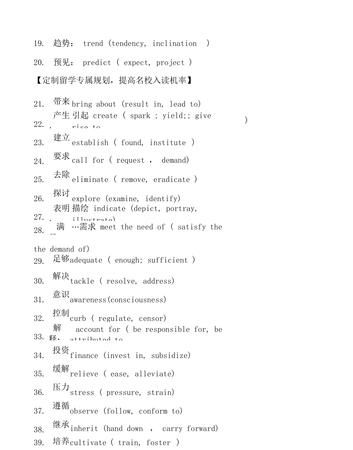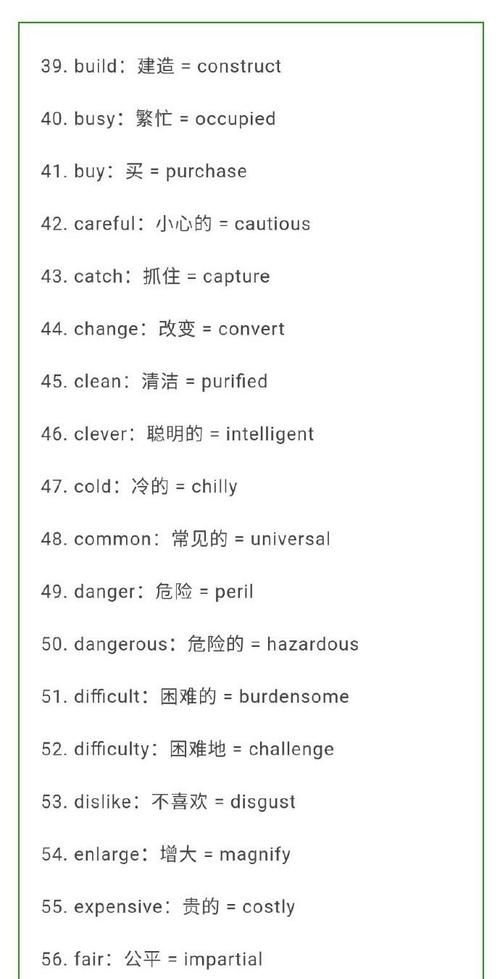本文目录
popular的同义词
popular
英音: ['pɔpjulə] 美音: ['pɔpjulə]
副词
1.流行的,受大众欢迎的,受喜爱的,受欢迎的,当红的
2.通俗的,大众(化)的
3.普通的;一般的;广泛的
4.公众的,民众的,百姓的
英英释义
representing or appealing to or adapted for the benefit of the people at large
carried on by or for the people (or citizens) at large
regarded with great favor, approval, or affection especially by the general public
(of music or art) new and of general appeal (especially among young people)
访问沪江小D查看popular的更多详细解释>
词形变化
副词: popularly
名称: popularity
动词: popularize
近义词辨析
这些形容词均含有“普通的,普遍的”之意。
common多用于指物,侧重很常见,不稀奇。
ordinary用于物,指每天发生,十分平淡无奇;用于人,指无特别之处,很一般。
commonplace强调缺少新意。
general语气强于common,侧重大多如此,很少有例外情况。
usual指常见常闻和常做的事或举动,强调惯常性。
popular指适应大众爱好、需要,为大家所公认或接受。
universal与general同义,但语气较强,侧重对每个人或事物都适用,根本没有例外。
相关短语
popularity rate 普及率
be popular 受欢迎
popular game 普及的运动项目
popular attention 普遍注意,广泛关注

popular的比较级和最高级
比较级:more popular,最高级:most popular。
【发音】[ˈpɒpjələ(r)]。
【释义】adj. 受喜爱的;受欢迎的;当红的;通俗的;大众化的;普遍的;大众的;流行的。
【相关搭配】
1、extremely popular:极其受欢迎的
2、increasingly popular:越来越受欢迎的
3、more popular:更加受欢迎的
4、most popular:最受欢迎的;最得人心的;最普遍的
5、wildly popular:非常受欢迎的
6、less popular:不受欢迎;冷门

词语用法:
popular的基本意思是“流行的”“大众喜爱的”,指受到大部分人所欢迎和喜爱的,作此解时,可用作定语,也可用作表语,常与介词in, among, with, for连用。
popular引申可作“通俗的”“大众(化)的”解,指适合一般人的爱好,需要或在一般人能理解的范围内,多含有贬义。作此解时,只用作定语。
popular还可作“普通的”“一般的”“广泛的”解。有时popular也可作“公众的”解,只用作定语,且没有比较等级。
初级英语和高级英语的区别
初级英语变高级英语
导语:把一些比较初级的词汇转换成比较高级的词汇写进你的作文,可以增加作文的档次哦。下面是我收集整理的初级英语变高级英语的词汇,欢迎参考!

★高频形容词:
1.贫穷的: poor = needy = impoverished = poverty-stricken
2. 富裕的.: rich = wealthy = affluent= well-to-do = well-off
3. 优秀的: excellent = eminent = top= outstanding
4. 积极的,好的: good = cOnducive= beneficial=advantageous:
5. 消极的,不良的: bad = detrimental = baneful =undesirable
6. 明显的: obvious = apparent = evident =manifest
7. 健康的 : healthy = robust = sound= wholesome
8. 惊人的: surprising = amazing = extraordinary = miraculous
9. 美丽的: beautiful = attractive = gorgeous = eye-catching
10. 有活力的: energetic = dynamic= vigourous =animated
11. 流行的: popular = prevailing = prent = pervasive
★高频动词:
1. 提高,加强: improve = enhance= promote = strengthen = optimize
2. 引起: cause = trigger = endanger
3. 解决: solve =resolve =address = tackle =cope with = deal with
4. 拆除: destroy = tear down = knock down = eradicate
5. 培养 : develop = cultivate = foster = nurture
6. 激发,鼓励: encourage = motivate = stimulate = spur
7. 认为: think = assert = hold = claim = argue
8. 完成: complete = fulfill = accomplish= achieve
9. 保留: keep = preserve = retain = hold
10. 有害于: destroy = impair = undermine = jeopardize
11. 减轻 : ease = alleviate = relieve = lighten
★高频名词:
1. 影响: influence= impact
2. 危险: danger = perils =hazards
3. 污染: pollution = contamination
4. 人类: human beings= mankind = humane race
5. 老人: old people= the old = the elderly = the aged = senior citizens
6. 幸福: happiness = well-being
7. 老师: teachers = instructors = educators = lecturers
8. 教育 education = schooling = family parenting = upbringing
9. 青少年: young people = youngsters = youths = adolescents
10. 优点: advantage = merits = superiority = virtue
11. 责任: respOnsibility= obligation= duty = liability
12 能力: ability = capacity = power= skill
13. 职业: job = career = employment = profession
14. 娱乐: enjoyment = pastimes = recreation= entertainment
15. 孩子: children = Offspring = descendant = kid
★高频短语:
1. 充满了: be filled with = be awashwith = be inundate with = be saturated with
2. 努力: struggle for = aspire after = strive for = spare no efforts for
3. 从事: embark in = take up = set about = go in for
4. 在当代 : in contemporary society = in present-day society= in this day and age
5. 大量的 : a lot of = a multitude of = a vast number of = a vast amount of
;popular的比较级和最高级
比较级:more popular,最高级:most popular .相信我,没错的

以上就是关于替换popular的高级词汇 ,popular的同义词的全部内容,以及替换popular的高级词汇 的相关内容,希望能够帮到您。
